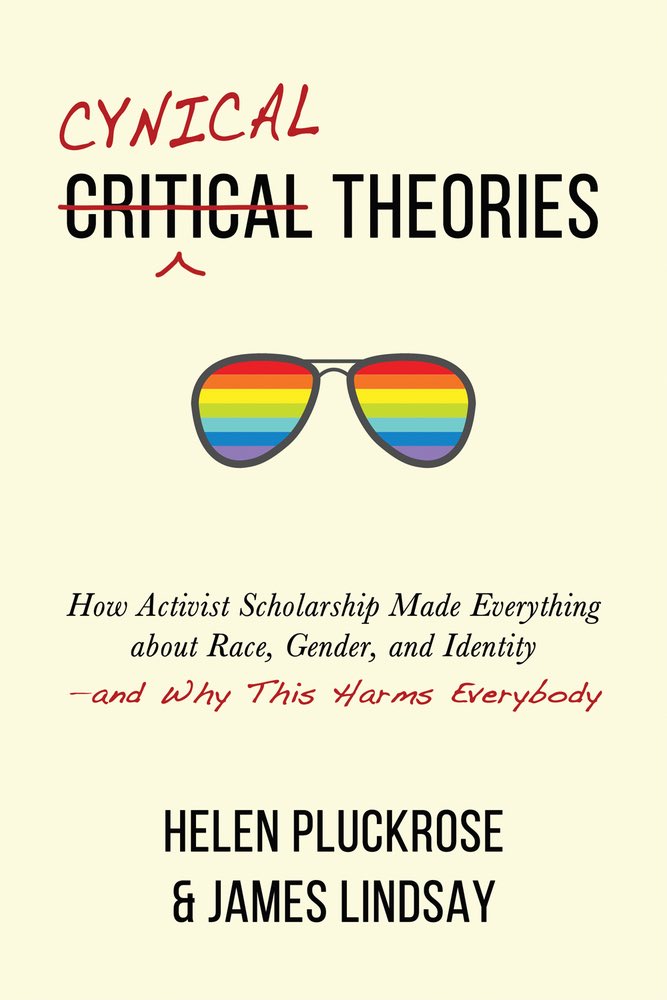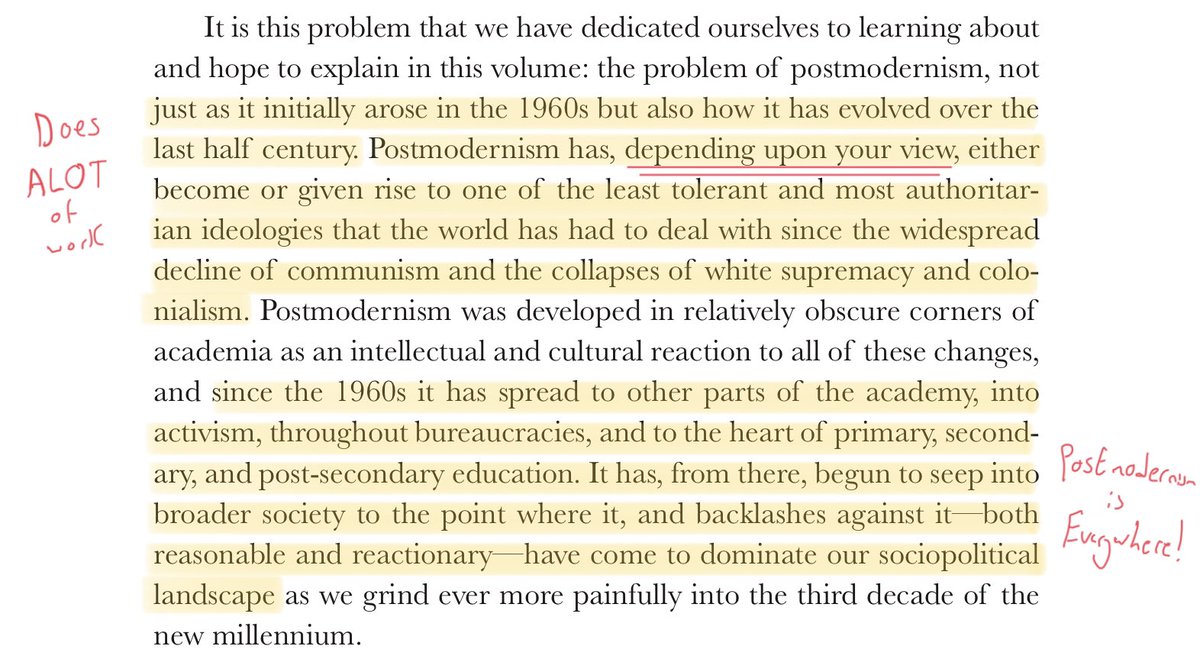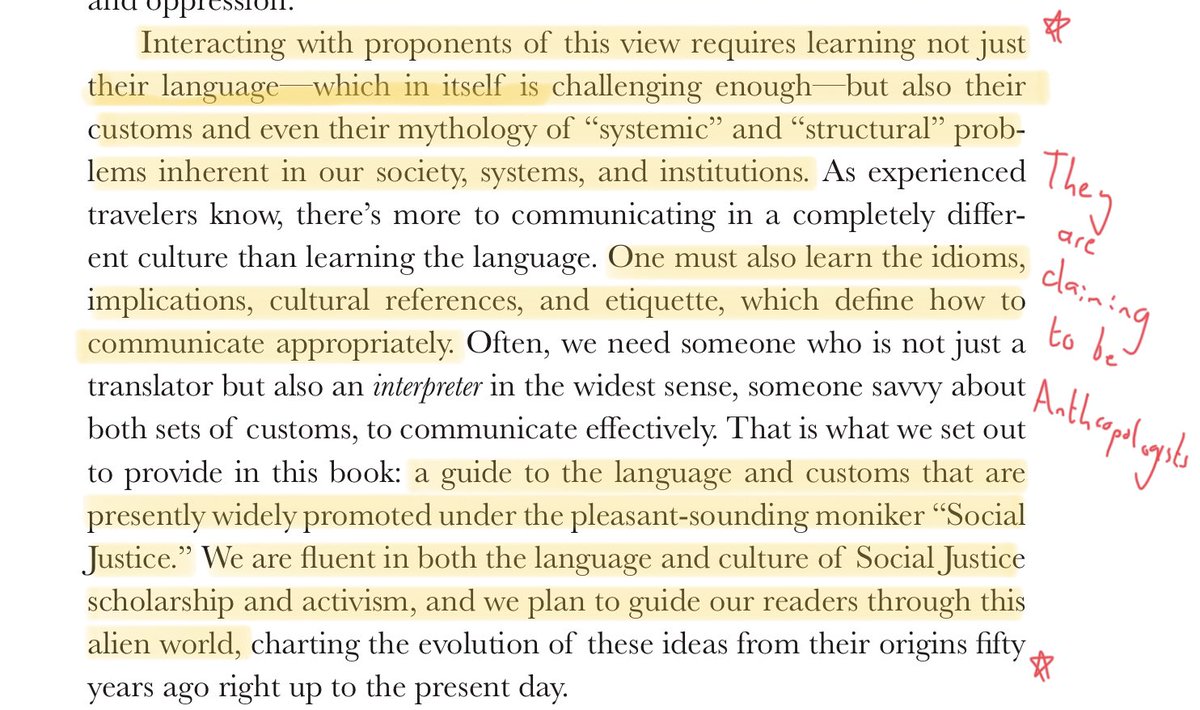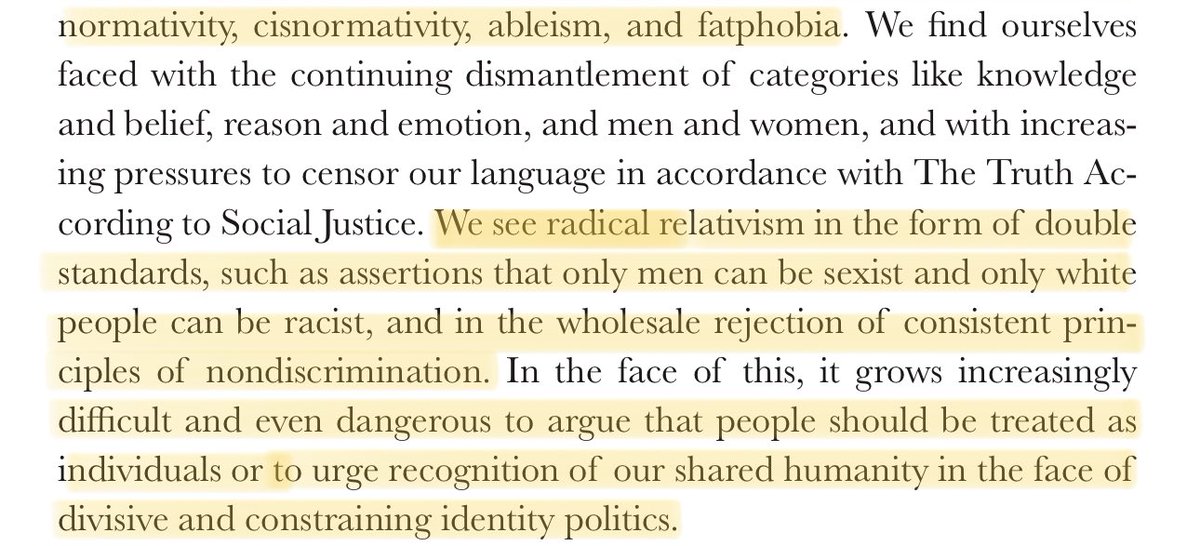So kicking off the chapter by chapter #CynicalTheories review/reaction-a-thon with a look at the Introduction. There’s quite a lot of ground covered over 9 pages so strap in.
The introduction starts with a rousing paean of ‘liberalism’ defined as a political philosophy that advocates political democracy, limitations on the powers of government, universal human rights, legal equality, freedom of expression, respect for viewpoint diversity & debate...
...respect for evidence and reason, the separation of church and state, & freedom of religion.
And this is contrasted against the opposing (evil) systems of ‘theocracy, slavery, patriarchy, colonialism, fascism, and other forms of discrimination’.
And this is contrasted against the opposing (evil) systems of ‘theocracy, slavery, patriarchy, colonialism, fascism, and other forms of discrimination’.
Funnily there’s even a non-ironic nod to prevalent social justice tropes with liberalism being praised as at its best when not just restricted to ‘wealthy white males’. I’d imagine that kind of concessionary hat tip to be largely due to Helen and her desire to appear fair.
In any case, barring some culture war wording (respect for viewpoint diversity) & a rather simplistic binary worldview there doesn’t seem much to object to here. Liberal democracy as preferable to repressive theocratic regimes... sure. I also agree liberalism can be a broad tent.
The next claim is more questionable, though I suspect many would agree with at least 50% of it. Namely, they contend that the liberalism (at the heart of ‘Western civilization’) is at ‘great risk’ from the twin dangers of 1) far right reactionaries & 2) far left revolutionaries.
They see the culture war as all encompassing and reflecting of this battle of ideologies. The inevitable question then would seem to be given the acknowledgment of the twin threat why they are fixated only on the revolutionary left? Their answer...
..is essentially that the right has always been crazy but that the left used to be sane & reasonable because it was based on ‘liberalism’ & so it is the side that has strayed ‘from its historical point of reason and strength’.  https://abs.twimg.com/emoji/v2/... draggable="false" alt="🤔" title="Denkendes Gesicht" aria-label="Emoji: Denkendes Gesicht"> Wonder if they will elaborate on this on RW media.
https://abs.twimg.com/emoji/v2/... draggable="false" alt="🤔" title="Denkendes Gesicht" aria-label="Emoji: Denkendes Gesicht"> Wonder if they will elaborate on this on RW media.
The secondary justification is that this is all due to the left’s embrace of postmodernism and how that, and reactions to, it has come to dominate all aspects of society, politics, and culture.  https://abs.twimg.com/emoji/v2/... draggable="false" alt="🤔" title="Denkendes Gesicht" aria-label="Emoji: Denkendes Gesicht">
https://abs.twimg.com/emoji/v2/... draggable="false" alt="🤔" title="Denkendes Gesicht" aria-label="Emoji: Denkendes Gesicht">
Certainly no hyperbole here.
Certainly no hyperbole here.
As the justification against a rather core objection about their focus this feels pretty flimsy to me but c’est la vie. Maybe they give more detail later. People can focus on what they want but when you identify two civilization level threats and then only discuss one...  https://abs.twimg.com/emoji/v2/... draggable="false" alt="🤷🏻♂️" title="Achselzuckender Mann (heller Hautton)" aria-label="Emoji: Achselzuckender Mann (heller Hautton)">.
https://abs.twimg.com/emoji/v2/... draggable="false" alt="🤷🏻♂️" title="Achselzuckender Mann (heller Hautton)" aria-label="Emoji: Achselzuckender Mann (heller Hautton)">.
Going to use one of my precious screenshots here to illustrate just how insidious and all encompassing they regard postmodernism, though as noted I think the *depending upon your view* here is doing A LOT of work.
Anyway, next we are introduced to the important distinction between (good) ‘social justice’ (a concept apparently with a 200 year history associated with Rawls...) and (evil) ‘Social Justice’ which is derived from critical theory and kicked off in the mid 20th century.
I think I actually agree with some core points here. 1) that there is no single ‘correct’ approach that can be attached to a nebulous concept like social justice and 2) that branding does not necessarily reflect commitment to a given value (see the Democratic People’s Republic).
However, we part ways on other grounds. In discussing issues with cancel culture (which they identify as stemming from Social Justice) they describe how counterintuitive this is to a ‘culture accustomed to placing human dignity first & thus valuing charitable interpretations...’
I’m sincerely wondering what culture they are imaging here, where this was ever the norm in public discourse? Being generous I’ll assume they are restricting the comment to (Western) culture in the contemporary era but even then that certainly doesn’t sound reflect my experience.
I’m not a ‘cancel culture’ skeptic (though the term is overused) but I am also skeptical of unspecified comparisons to an idealized past ‘culture’ that can be invoked whenever convenient.
Anyway, the chapter moves on and devotes quite some space (and vivid prose) to outlining just how much they dislike the critical scholar-activists. They are likened to aliens with their own arcane language and no understanding of normal human biology, interactions, or customs.
I’ll admit some of the broadsides here are kinda funny (to me) but the biggest laugh for me came when they devoted a paragraph to essentially claiming to be anthropologists of Social Justice.
Next they outline the structure of the book. In part they personify postmodernism and Theory, treating the former as the bastard offspring of the latter. And tracing how it evolved and came to interact with(/utterly dominate) the world.
They claim the book will do two things 1) explain how Theory has developed into the driving force of the culture war and 2) propose ‘a philosophically liberal way to counter its manifestations in scholarship, activism, and everyday life’. (Maybe by cheering on Trump? Sorry...)
Chapters 1 & 2 promise to cover postmodernism from the 1960s up to the 1990s. Then 3 chapters covering various Theory laden fields. With chapter 7 on disability and fat studies (separated because they are newer?). Chapter 8 is on ‘reified postmodernism’... from 2010 onwards.
Chapter 9 looks at real world impacts (I’m expecting a condensed The Madness of Crowds) and Chapter 10 outlines their alternative ideology to Social Justice and how it may help vanquish this vile ideology. Let’s see.
Chapters 1-8 are explained to be providing the necessary foundational knowledge for any would-be Anti Social Justice warrior and chapters 9-10 are aimed at getting them ready to go on the counter attack. There is a very real sense here of heroes fighting the forces of darkness.
For a less cynical take... it seems clear they see the spread of postmodernism & rise of Theory as huge, potentially civilization threatening, developments. They seem sincere in their concerns & describe how this undermines nondiscrimination and recognition of shared humanity.
There’s also an obvious link between James’ anti-theist work and the opposition to Social Justice which is not exactly subtle. I’m sure this will come up in more depth in later chapters but it feels like it belongs in that popular genre of ‘everything I don’t like is religion’.
Not to say they aren’t legitimate points of comparison that can be made. I’ll just wait till they are fleshed out before judging. I do remember that massive article he wrote on this topic before so I’d hazard a guess it’ll mainly reiterate those points.
Anyway, the Introduction concludes with a description of the target audience. I think I fall under the category of an interested lay person, I’m certainly not an expert in Critical Theory so will be interested to see how convincingly they make their case.
There’s also another interesting disclaimer paragraph, explaining the book isn’t seeking to undermine LGBT equality or attack academia/universities, where I again sense Helen’s fingerprints. I’d screenshot but I’ve used my three.
And finally the chapter ends with a prediction about how the book will be responded to. They describe three possibilities: 1) dismissal as right wing reactionaries, 2) acceptance as deluded liberals with improper analysis, 3) people who accept that their points have some merit...
...and engage them in good faith. That does seem to leave out the possibility of 4) people who respond in good faith and do not find their arguments to have merits but I guess authors need to be confident in their views.
In any case, I’ll try to limit my natural cynicism.
In any case, I’ll try to limit my natural cynicism.

 Read on Twitter
Read on Twitter





